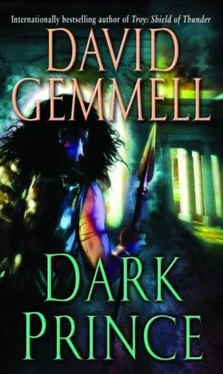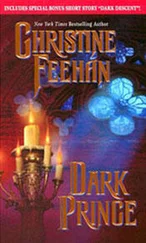His victories stretched across the Empire, from India in the east to Scythia in the north, from Egypt in the south to the northern Caspian Sea. He was a living legend throughout the world — adored by his troops, feared by the many enemies he had forced back from the frontiers of his new realm.
Yet, as he stood on this bright summer morning by the window of his palace rooms, he thought nothing of his reputation.
'Are you still set on this course, sire?' asked Ptolemy, moving forward to embrace his King.
'I have no choice, my friend.'
'We could seek the help of wizards — there are some in Babylon said to be most powerful.'
Alexander shook his head. 'I have travelled far to find a way to fight the Beast. All are agreed that I cannot defeat him. He is immortal, everlasting. And the power of the necklet is fading fast. Do you want to see the old Alexander return?'
'No, my lord. But… I wish Hephaistion were here. He would be able to advise you better than I.'
Alexander did not answer, but swung his head to stare from the window. It was the death of his beloved Hephaistion which had decided him upon this course of action. The Macedonian — the most trusted of the King's officers — had been found dead in his bed, apparently choked to death. Of the night in question, twelve weeks before, Alexander could remember nothing.
The surgeons had found a chicken-bone wedged in Hephaistion's throat, and it appeared that the officer had died while dining alone.
Alexander wanted to believe it. Desperately. For Hephaistion, above all his friends, had helped him during the seven years since Aristotle had taken Parmenion. As the power of the necklet faded, it was Hephaistion whose constant love and friendship had been the rock to which Alexander had clung when the Beast had been clawing at him, dragging him down.
Now Hephaistion was gone and the final battle was here.
'You will do as I bid — no matter what?' he asked Ptolemy.
'Oh my life I promise it.'
'No one must lay their hands upon. . it.'
'Nor shall they.'
'You must go to Egypt. Make the land your own. Hold it against all the others.'
'There may be no war, sire. We are all friends.'
Alexander laughed. 'You are friends now ,'' he said. 'Leave me, Ptolemy. And tell no one what I plan.'
'It will be as you say.'
The general bowed once and turned to leave. Then suddenly he swung back to Alexander, embracing him and kissing his cheek. No more was said and, tears in his eyes, the officer left the room, pulling shut the door behind him.
Alexander walked to the table and filled a goblet with the wine he had prepared earlier. Without hesitation he lifted it to his lips and drank. Then moving to a bronze mirror on the far wall, he examined the necklet. There was little gold showing now; the interlaced wires had become black as jet.
'Just a little longer,' he whispered.
His servants found him lying on his bed at dusk. At first they moved around him, thinking him sleeping, but after a while one of them moved to his side, touching his shoulder.
'My lord! Sire!' There was no answer.
In panic they ran from the room, summoning Perdiccas, Cassander, Ptolemy and the other generals. A surgeon was called — a slim, wiry Corinthian named Sopeithes. He it was who found the pulse still beating at Alexander's throat.
While no one was watching him, Ptolemy took the goblet containing the dregs of the drugged wine and hid it in the folds of his cloak.
'He is not dead,' said the surgeon, 'but his heart is very weak. He must be bled.'
Three times during the next five days a vein in the King's arm was opened, but at no time did he regain consciousness.
Time slipped by, and soon it became apparent to all that Alexander was dying. Ptolemy quietly made the arrangements Alexander had ordered, then he sat by the King's bedside.
On the twelfth night, with only Ptolemy beside him, Alexander's voice whispered out for the last time: 'Kadmilos.'
Alexander sat at the mouth of the tunnel, a golden sword shining in his hand and casting its light upon the grey, dead soil of the Void. Some distance away, sitting upon a boulder watching him, was a twin Alexander dressed in silver armour, white hair framing his handsome face, ram's horns curving back from his temples.
'Poor Alexander,' taunted Kadmilos. 'He came to slay me. Me? He thought to use his pitiful sword against a spirit that has lived since before time. Look around you, Alexander. This is your future. No kingdoms here in this world of ash and twilight. No glory.'
'You are a coward,' the King told him wearily.
'Your words are useless, Human. Even if I allowed that sword to strike me I would not die. I am eternal, the living heart of Chaos. But you, you are pitiful. Your body still lives in the world of flesh, and soon I shall take possession of it. The drugs you swallowed will not deter me. It will be a matter of moments to nullify them. Then I shall heal your ruined lung and your wasted leg.'
'Come then,' offered Alexander, 'walk by me.'
Kadmilos laughed. 'Not yet. I shall walk the path to your soul when it pleases me. Look at your sword, Alexander.
See how it fades. The last lingering Enchantment of the necklet is almost gone. When it dies, your blade will die with it. You know that?'
'I know,' answered the King. 'The priests of Zeus-Ammon warned me of it.'
'Then what did you hope to achieve?'
The King shrugged. 'A man must always fight for what he believes to be right. It is his nature.'
'Nonsense. It is a man's nature to lust, to long for all he cannot have, to kill, to steal, to plunder. That is why he is -
and will always remain — a creature of Chaos. Look at you! By what right did you lead your armies into Persia? By what right did you impose your will upon the world? Your name will be remembered as a killer and a destroyer — one of my more glorious disciples.'
Kadmilos laughed again, the sound chilling. 'No arguments, Alexander? Surely you can summon some small defence for your actions?'
'I have no need of defence,' answered the King. 'I lived in a world governed by war. Those who did not conquer were themselves conquered. But I fought my enemies on the battlefield, soldier against soldier, and I risked my life as they risked theirs. I carry no shame for any action of mine.'
'Oh, well said,' sneered Kadmilos. 'Will you deny the surging passions aroused when you marched into battle, the lust for slaughter and death in your own heart?'
'No, you are wrong,' replied Alexander. 'I never lusted for slaughter. Battle, yes, I will admit to that. Pitting my strength and my will against my enemies — that gave me pleasure. But you it was who gained the most satisfaction from random butchery.'
Kadmilos stood. 'Your conversation is dull, Human, and I see your sword is now but a miserable shadow. Therefore we must end this meeting. Your mortal form awaits me.'
Alexander looked down at the fading sword, and even as he gazed upon it the weapon vanished from his hand.
'Enjoy your despair,' hissed Kadmilos, his form swelling, changing, becoming a dark cloud that flowed over Alexander, swirling into the tunnel and on towards the flickering light in the far distance.
The Void was empty now, save for a floating mist that seeped across the barren rocks. Alexander sighed, his heart heavy.
A figure moved from the mist, and the King saw it was Aristotle. The magus smiled and reached out to take Alexander's hand.
'Come, my boy, I cannot stay here long. But there is time enough to lead you to the Elysian Fields where your friends await.'
'Did I win? Did I hold him for long enough?'
'We will talk as we travel,' the magus answered.
Читать дальше












